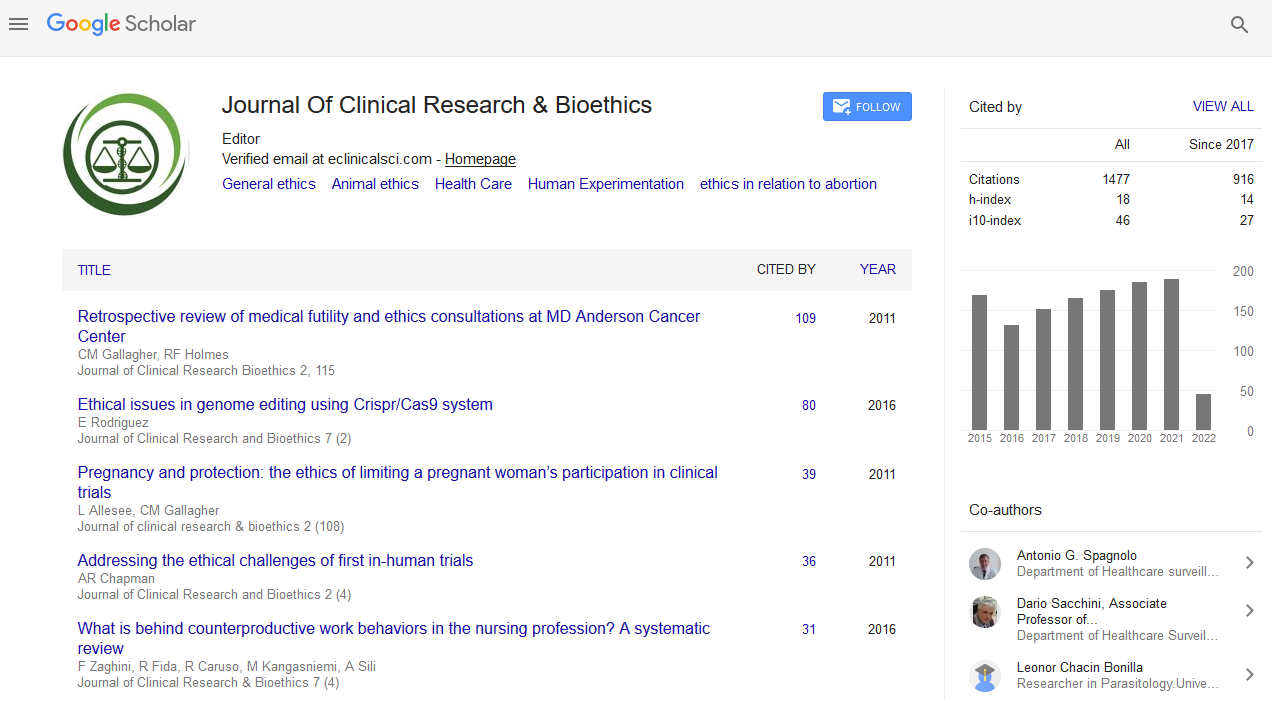PMC/PubMed Indexed Articles
Indexed In
- Open J Gate
- Genamics JournalSeek
- JournalTOCs
- RefSeek
- Hamdard University
- EBSCO A-Z
- OCLC- WorldCat
- Publons
- Geneva Foundation for Medical Education and Research
- Google Scholar
Useful Links
Share This Page
Journal Flyer

Open Access Journals
- Agri and Aquaculture
- Biochemistry
- Bioinformatics & Systems Biology
- Business & Management
- Chemistry
- Clinical Sciences
- Engineering
- Food & Nutrition
- General Science
- Genetics & Molecular Biology
- Immunology & Microbiology
- Medical Sciences
- Neuroscience & Psychology
- Nursing & Health Care
- Pharmaceutical Sciences
Challenges in clinical nutritional research: How adaptive design can help?
3rd International Conference on Advanced Clinical Research and Clinical Trials
September 20-21, 2017 Dublin, Ireland
Tanguy Jerome,Shein-Chung Chow
Nestle Research Center, Switzerland
Duke University School of Medicine, USA
Scientific Tracks Abstracts: J Clin Res Bioeth
Abstract:
Human studies are essential to obtain evidence of beneficial effects of nutritional interventions on health. Clinical nutritional development plans include a range from small pilot trials to well-designed confirmatory studies, following good clinical practices. Nutrition interventions are generally safe compared to pharmaceutical compounds. Regulatory guidance limits the benefits of nutrition to the maintenance of normal function or the reduction of accepted risk factors. Therefore, nutritional trials do not necessarily follow the same development process as pharmaceutical products. The objectives focus more on maintaining health and preventing risk factors for disease rather than showing efficacy in disease conditions. Clinical trials in the nutritional field have specific challenges to overcome in terms of population, intervention, design and methodology. Additional challenges are the lack of learning phases, small beneficial effects, high heterogeneity of the responses and difficulties in finding appropriate endpoints. In recent years, the use of adaptive design methods in clinical trials has received much attention due to its flexibility and efficiency in clinical development. In practice, adaptive design may provide the opportunity to modify certain aspects of the trial design while the study is still ongoing, without violating the quality and the integrity of the data. However, introducing more flexibility may come with many difficulties: major adaptations of on-going trials may result in designs unable to address the original scientific/medical questions. In addition, fundamental differences between pharmaceutical and nutritional research potentially trigger limitations but also opportunities for the application of such innovative design. The aim of this work is to highlight specificities and challenges in nutritional clinical trials, review the concepts of adaptive design and then address the advantages, limitations, and feasibility of commonly considered adaptive designs. Statistical, clinical, operational and regulatory aspects of implementing adaptive designs will be discussed.
Biography :
Tanguy Jerome has been working in the field of Biostatistics for 10 years in R&D entities of international food companies. Over the years, he contributed to the development of the statistical thinking and clinical trials within the food industry. During the last decade, his methodological research was mainly focused on advanced modeling (mixture modeling, frailty model and latent process model) which has led to yearly contribution during international statistical congresses. Recently, his field of interest focused on the implementation and development of adaptive trials in nutritional research.
Shein-Chung Chow, PhD. is currently a Professor at the Department of Biostatistics and Bioinformatics, Duke University School of Medicine, Durham, NC. Prior to joining Duke, Dr. Chow also held various positions in the pharmaceutical industry. Dr. Chow is the Editor-in-Chief of the Journal of Biopharmaceutical Statistics and the Biostatistics Book Series at Chapman and Hall/CRC Press of Taylor & Francis Group. He is an ASA Fellow (1995). He was recently appointed as an Advisory Committee member and consultant to the FDA by the FDA. Dr. Chow is the author or co-author of over 280 methodology papers and 28 books


